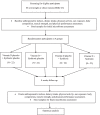The effects of synbiotic and/or vitamin D supplementation on gut-muscle axis in overweight and obese women: a study protocol for a double-blind, randomized, placebo-controlled trial
- PMID: 35927757
- PMCID: PMC9351060
- DOI: 10.1186/s13063-022-06598-x
The effects of synbiotic and/or vitamin D supplementation on gut-muscle axis in overweight and obese women: a study protocol for a double-blind, randomized, placebo-controlled trial
Abstract
Background: Sarcopenia refers to an age-related loss of skeletal muscle content, strength, and function, leading to a decrease in mobility. Obesity may exacerbate age-related complications such as sarcopenia through inflammatory pathways. In addition, intestinal dysbiosis has been proposed as an emerging contributor to sarcopenia due to the stimulation of the immune system and elevated barrier permeability of the intestine. Targeting microbiome with synbiotic and vitamin D supplementation may modulate the microbiome followed by the enhancement of sarcopenia indices. Thus, the present study aims to evaluate the effect of synbiotic supplementation with or without vitamin D on the intestinal microbiome and its relationship with strength, muscle function, and body composition in middle-aged overweight and obese women.
Methods: This multi-factorial, double-blind, randomized controlled trial will be conducted on 88 participants in eight weeks. The participants will be allocated into four groups receiving vitamin D placebo (weekly) and synbiotic placebo (daily), vitamin D and synbiotic placebo, vitamin D placebo and symbiotic, and vitamin D and synbiotic. Intestinal microbiome assessment will be done by DNA isolation and real-time polymerase chain reaction (PCR). In addition, anthropometric indices, body composition, muscle strength, and physical performance will be evaluated by standard methods. All measurements will be made at the beginning and end of the study.
Discussion: The previous studies showed that probiotics were involved in reducing inflammation, insulin sensitivity, modulation of atrophy markers such as atherogen-1, and decreasing reactive oxygen indices. In addition, vitamin D was found to improve the intestinal microbiome and facilitate muscle anabolism. The present protocol is novel as it aims to investigate the impact of the co-supplementation of synbiotic and vitamin D on the gut microbiome and sarcopenia indices.
Trial registration: This trial has been registered in the Iranian Registry of Clinical Trials (IRCT20090822002365N25, date of registration: March 2021).
Keywords: Microbiome; Muscle mass; Obese women; Sarcopenia; Synbiotic; Vitamin D.
© 2022. The Author(s).
Conflict of interest statement
The authors declare that they have no competing interests.
Figures
Similar articles
-
Investigating the effects of synbiotic supplementation on functional movement, strength and muscle health in older Australians: a study protocol for a double-blind, randomized, placebo-controlled trial.Trials. 2024 May 7;25(1):307. doi: 10.1186/s13063-024-08130-9. Trials. 2024. PMID: 38715143 Free PMC article.
-
The effect of synbiotic and vitamin D co-supplementation on body composition and quality of life in middle-aged overweight and obese women: A randomized controlled trial.Clin Nutr ESPEN. 2022 Dec;52:270-276. doi: 10.1016/j.clnesp.2022.09.005. Epub 2022 Sep 10. Clin Nutr ESPEN. 2022. PMID: 36513465 Clinical Trial.
-
Effect of a Multispecies Synbiotic Supplementation on Body Composition, Antioxidant Status, and Gut Microbiomes in Overweight and Obese Subjects: A Randomized, Double-Blind, Placebo-Controlled Study.Nutrients. 2023 Apr 13;15(8):1863. doi: 10.3390/nu15081863. Nutrients. 2023. PMID: 37111082 Free PMC article. Clinical Trial.
-
Effect of vitamin D monotherapy on indices of sarcopenia in community-dwelling older adults: a systematic review and meta-analysis.J Cachexia Sarcopenia Muscle. 2022 Jun;13(3):1642-1652. doi: 10.1002/jcsm.12976. Epub 2022 Mar 8. J Cachexia Sarcopenia Muscle. 2022. PMID: 35261183 Free PMC article. Review.
-
Current Research on Vitamin D Supplementation against Sarcopenia: A Review of Clinical Trials.Int J Sports Med. 2023 Nov;44(12):843-856. doi: 10.1055/a-2116-9240. Epub 2023 Aug 9. Int J Sports Med. 2023. PMID: 37557905 Review.
Cited by
-
Dietary Polysaccharides Exert Anti-Fatigue Functions via the Gut-Muscle Axis: Advances and Prospectives.Foods. 2023 Aug 17;12(16):3083. doi: 10.3390/foods12163083. Foods. 2023. PMID: 37628082 Free PMC article. Review.
-
Progress of linking gut microbiota and musculoskeletal health: casualty, mechanisms, and translational values.Gut Microbes. 2023 Dec;15(2):2263207. doi: 10.1080/19490976.2023.2263207. Epub 2023 Oct 6. Gut Microbes. 2023. PMID: 37800576 Free PMC article. Review.
-
Potential tactics with vitamin D and certain phytochemicals for enhancing the effectiveness of immune-checkpoint blockade therapies.Explor Target Antitumor Ther. 2023;4(3):460-473. doi: 10.37349/etat.2023.00145. Epub 2023 Jun 30. Explor Target Antitumor Ther. 2023. PMID: 37455830 Free PMC article.
References
-
- Carmeli E. Sarcopenia in older adults. Muscular Atrophy. Vienna: IntechOpen; 2020.
Publication types
MeSH terms
Substances
LinkOut - more resources
Full Text Sources
Medical



